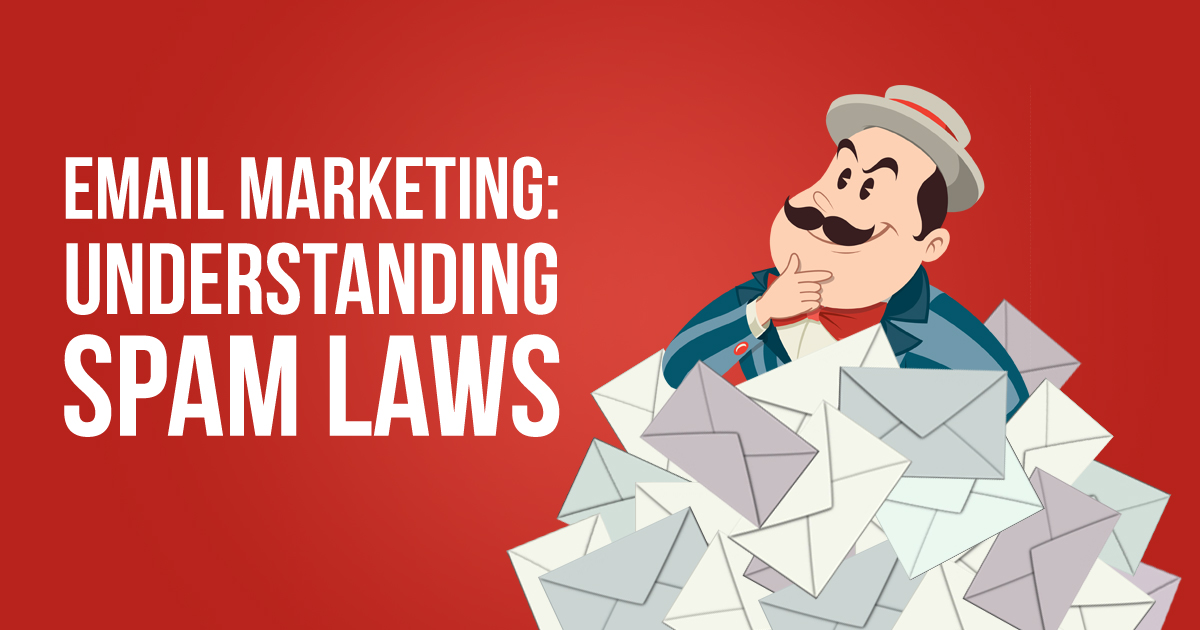
Don’t Get Caught Spamming: 10 Email Spam Laws You Need to Know for Your Marketing
How To & Business Tips Marketing Tips
Are you using email marketing to connect with your customers?
Make sure you aren’t accidentally spamming them!
Unfortunately, even well-intentioned marketers may be in violation of spam laws.
Spammers have given email marketing a bad reputation with consumers. They’ve exploited e-newsletters by sending emails to anyone and everyone, regardless of how they obtained their data. Sometimes the content they send is actually for a real company but they’ve simply disregarded spam laws, while other times the spammers are actual criminals attempting to swindle unsuspecting recipients.
So how can you optimize your email marketing while ensuring that you follow the laws? Luckily, there’s just one main law that you need to understand to make this easy.
The CAN-SPAM Act of 2003, put in place by President George H.W. Bush, set the international standard for commercial email. CAN-SPAM is short for “Controlling the Assault of Non-Solicited Pornography and Marketing.” The Federal Communications Commission oversees it.
If that sounds daunting, don’t worry! We’ve broken down the 10 rules that you need to understand to use email marketing effectively:
10 Laws – 10 Rules – It’s Easy!
1. Your Customer Must Opt-In
People must give their consent to receive information from you. To give people an opportunity to provide written consent, you must include a “checkbox” on your web form.
2. Tell Your Customers How They Can Opt-Out
Your customers must be able to choose when to unsubscribe from receiving information from you. Your customers also need to be able to decide what they want to receive. If you have a menu of options beyond Yes/No, there needs to be a “No Communication” option.
Make it clear that the customer can decide to opt-out at any time, and give them clear instructions on how to do so. Don’t avoid this by hiding the unsubscribe links with a tiny font–make it easy for them.
You have to give your customers a return email address, or another internet-based option for them to opt out. Using an email service provider like MailChimp or iContact will also help!
3. When Customers Opt-Out, Honour Their Request Quickly
So you’ve set up an easy opt-out system? Great, now make sure that you honour their requests to opt-out as quickly as possible. By law, you have 10 business days. Also, your opt-out mechanism must allow you to process opt-out requests for at least 30 days after your message was sent.
Don’t charge fees, require additional information beyond their email address, or make them do anything else. Once you’ve removed them from your list, it’s illegal to sell or transfer their information to other parties (unless it’s a company that you hired to assist you with CAN-SPAM Act compliance).
4. No Bait and Switch or Misleading Subject Lines
It’s tempting to use intriguing subject lines, but make sure that you aren’t misleading the customer or worse, outright lying. Your subject line must accurately reflect the content of your email. For example, if you’re offering them a 10% off discount, you can’t suggest in the subject line that the discount is higher. Steer clear of the bait and switch tactics of spammers, like those “You’re a Winner!” email scams!
5. Your Header Information Must Be Real
Your customers have a right to know who emails are coming from, so make sure that your “From,” “To,” and “Reply To” fields accurately represent your company. Make sure that your routing information is clear, including the email address and origination domain name.
6. Provide a Real Mailing Address
You have to prove that you’re a real company, and that means providing your customers with a valid postal address. This also helps you to build trust with your customers.
Your Options:
– Your Company’s Street Address
– Your Home Address (If you work from home)
– A Post Office Box
– A private mailbox, registered with a commercial mail receiving agency
7. Tell Customers It’s an Ad
Email marketers try to skirt this rule because savvy customers know an ad when they see one. No fooling. The CAN-SPAM Act requires that you let customers know that the email is an ad. Don’t try to fool them.
8. Be Careful with Forward-to-a-Friend Programs
The CAN-SPAM Act allows you to offer referral links for your customers to send on to friends. However, if you offer an incentive to them for doing so, like a discount code or a chance to win a prize, you’re responsible for them forwarding on your email.
9. Know the Definition of “Commercial Email”
Basically, if the primary purpose of your email is to sell or promote something, it’s a commercial email.
This only applies to commercial mail, not to transactional or relationship mail. If you send your customers receipts, warranties, or changes to their membership status, you just have to ensure that your routing information is correct. However, if you add anything that looks like advertising, they could be classified as commercial emails. Be careful if the content of your email and/or the links lead to advertising or to a company website.
10. Always Know What Others Are Doing on Your Behalf
You’re responsible for the actions of any person or company that is doing email marketing on your behalf. Keep a watch over anyone that you’ve hired, and ensure that everything they’re doing is in compliance with the law.
Recap
You definitely don’t want to break any laws or be associated with spammers–ever! You want your company to be an example of high caliber marketing in your industry. Successful email marketing means avoiding anything that could be accused of spamming.
Make sure that you’re up to date with the laws, so you can enjoy great results from your email marketing campaigns without getting into trouble or paying hefty fines. A lot of it is common sense, and what you would look for yourself as a consumer. If you need help with your email marketing, don’t hesitate to contact us and we’d be happy to give you a free consultation.
For more detailed information, you can also refer to: http://kb.mailchimp.com/accounts/compliance-tips/about-the-canada-anti-spam-law-casl



